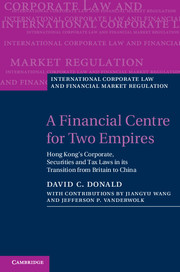 A Financial Centre for Two Empires
A Financial Centre for Two Empires Published online by Cambridge University Press: 05 June 2014
Evaluating Hong Kong law on the basis of local risks
As we have seen in Chapter 1, Hong Kong is fascinating from the points of view of comparative law and socio-economic development. It combined the peculiar characteristics of a colony enduring on the territory of an unconquered, albeit weakened, China that served as a refuge for subjects fleeing China during various periods of economic, political and social woes, and was then transferred back to China as this country’s economy skyrocketed towards global economic leadership, destined to serve a crucial role as booming China’s (preliminary?) international financial centre. Britain kept Hong Kong, like any other colony, only because it served commercial and strategic purposes, but unlike almost all colonies, Hong Kong developed into a unique, cultural sub-unit of the nation from which it was carved out, with a large, homogeneous majority of Chinese ‘voluntarily’ accepting (ultimate) rule (outside of their local, private ordering) by a tiny minority of British officials. The arrangement was accepted ‘voluntarily’ because the colonial government usually presented a better political and economic milieu than did mainland China during the colony’s 156 years of existence. The core of Hong Kong’s early legal system was a collection of ordinances designed to meet colonial needs, coupled with a link to the common law as it developed in Britain and its empire. The larger outer circle of social ordering in Hong Kong more often consisted of arrangements under Chinese customary law and practice, and we have seen in Chapter 1 that the colonial government openly recognized this. Following a century and a half of incubation during which these English and Chinese ordering arrangements interacted with each other, the community of about seven million Chinese with an Anglicized legal system, public administration and sense of justice rejoined their mother country as a ‘Special Administrative Region’. Hong Kong had flipped from being a mainly Chinese component serving British foreign commerce to an Anglicized unit serving Chinese international finance. Only history will tell us what impact this small bit of leaven will eventually have on the massive Chinese loaf.
To save this book to your Kindle, first ensure [email protected] is added to your Approved Personal Document E-mail List under your Personal Document Settings on the Manage Your Content and Devices page of your Amazon account. Then enter the ‘name’ part of your Kindle email address below. Find out more about saving to your Kindle.
Note you can select to save to either the @free.kindle.com or @kindle.com variations. ‘@free.kindle.com’ emails are free but can only be saved to your device when it is connected to wi-fi. ‘@kindle.com’ emails can be delivered even when you are not connected to wi-fi, but note that service fees apply.
Find out more about the Kindle Personal Document Service.
To save content items to your account, please confirm that you agree to abide by our usage policies. If this is the first time you use this feature, you will be asked to authorise Cambridge Core to connect with your account. Find out more about saving content to Dropbox.
To save content items to your account, please confirm that you agree to abide by our usage policies. If this is the first time you use this feature, you will be asked to authorise Cambridge Core to connect with your account. Find out more about saving content to Google Drive.